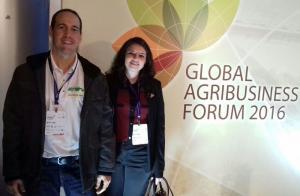by Lais Thomaz* and Dan Quadros** (Advanced Biofuels USA) With diverse and dynamic programming involving agribusiness, food safety, nutrition, sustainability and bioenergy, the 2016 GAF achieved its mission to gather producers, companies and academia to discuss the importance of agribusiness supply chains in the world.
GAF is held every two years. In its third edition, in Sao Paulo, Brazil, 1400 participants, 700 companies, 120 associations and representatives of about 40 countries and international organizations such as FAO and World Organization for Animal Health (OIE) attended the event. In addition, several universities participated through real time transmission. The event was broadcast on two TV channels and online. It was consolidated to become one of the most relevant agribusiness events in the world and likely will become even more global, moving GAF outside Brazil
The Big Players in Agribusiness: Brazil and United States Lay the Cards on the Table
Complementing the significant participation of actors from other countries, Brazil's leading role in this area was highlighted in several exhibitions and presentations. In addition, the conference had strong support from Brazilian politicians. On the occasion were present: The interim President of Brazil Michel Temer; Congress Agribusiness Parliamentary Front; Ministers of Agriculture, Mines and Energy and Foreign Affairs and Governors of the states of Mato Grosso and Sao Paulo.
In this time of uncertainty about the outcome of President Dilma Rousseff’s impeachment process, which should be decided after the Olympics, Brazil’s interim President Michel Temer received a confidence manifesto signed by 46 Brazilian entities. The economic and political crisis in the country has worsened since 2014, but agribusiness remains a solid and prosperous sector, representing 25% of jobs, 20% of GDP and 46% of Brazilian exports.
Facing the global growth of population, it was evident by many presenters that Brazil and the USA will have a crucial role in food production and international trade to feed the world.
From Brazil’s perspective, attracting more investment is essential to this role. For this reason, the president of APEX-Brazil, Roberto Jaguaribe and the Minister of Foreign Affairs, José Serra, emphasized new strategies for Brazilian trade promotion with emerging markets like Africa and Asia. Serra argued that Brazil, with the fundamental performance of APEX-Brazil, should seek to discover new opportunities and, at the same time, must concentrate its efforts to suspend sanctions on Brazilian products.
According to the Minister of Agriculture Blairo Maggi, Asia - not only China - is the main target market, but Brazil cannot ignore the US and EU to achieve 10% of the world’s agricultural trade.
In order to overcome Brazil’s weaknesses, Marcos Jank, Vice-President of BR Foods, one of the biggest food companies in the world, presented an agenda that should be pursued by the sector, which includes five international challenges that Brazil needs to improve: (i) market access, with strong advocacy work; (ii) trade promotion in order to added value to its products; (iii) competitiveness, reducing the infrastructure costs and generating more productivity; (iv) creating a better imagine of the country, highlighting its sustainability efforts; and (v) becoming part of a global value chain with the internationalization of companies and associations.
 Presentation by former Brazilian Minister of Agriculture, Alysson Paolinelli with Pamela Johnson, farmer and Past President of US National Corn Growers Association
Presentation by former Brazilian Minister of Agriculture, Alysson Paolinelli with Pamela Johnson, farmer and Past President of US National Corn Growers Association
The presence of US officials during the debates was remarkable. Ambassador Darci Veter, Chief Agricultural Negotiator for the US Trade Representative, and Warren Preston, Deputy Chief Economist of the US Department of Agriculture, stressed the importance of fostering cooperation to improve negotiations and agricultural trade.
Ambassador Veter noted the necessity of seeking international institutions to reduce tariffs and creating international standards through World Trade Organisation trade facilitation and Organisation for Economic Co-operation and Development trade mechanisms. Besides that, governments should focus on stability for farmers. "Our governments need to work together to achieve the goal of producing more with less resources,” emphasized Veter.
President Temer declared that Brazil owes much to agribusiness and that "many foreign investors are waiting a bit to see what happens in a month, a month and a half, to then invest very strongly in Brazil." He emphasized the importance of ethanol for export and he is looking forward to traveling to other countries in order to incentivize them to invest in Brazil, if he continues as President after August.
Temer declared that he is doing everything to get the train on track again. "Let’s bring back the international investments to Brazil," he said. Following legal protocol of impeachment, the congress will decide if he continues as President next month.
Feeding and Fueling a Growing World Population: Summary of GAF Presentations
"Preparing to feed 9 billion people in 2050, a large part of them coming from poverty and reaching middle class in developing countries (consequently increasing demand for food and energy), on a sustainable basis presents a big challenge," said Pamela Johnson, farmer and former President of National Corn Growers Association (NCGA), USA. That is why people who increasingly live in cities should worry about how things are going in fields. Because resources are limited and anthropogenic impacts are diminishing them even more, affecting all of us.
In the agricultural production expansion process, USDA, European Union and Brazil evaluations expect 40% will take place in Brazil. According Geraldo Martha Junior of EMBRAPA (Brazilian Agricultural Research Corporation), Brazil still has 65% of land conserved in Amazon forest, national parks and farms, following one of the strictest environmental regulations in the world. Declined pastures (around 40 to 60 million hectares) are the main focus to be converted into sustainable agriculture, using practices such as crop-livestock integration, no-till farming, and others.
Another important point in sustainability is the carbon budget of each activity. One comprehensive way to compare different systems is life cycle assessment (LCA). Many countries committed to reducing carbon emissions and have had positive results. Unfortunately, progress in mitigating greenhouse gases emissions has been too little and too slow considering the fragility of our environment and the expectation of climate changes according to different models.
In the agricultural context, there is a technological revolution going on, and things are being done with more precision. However, what is coming soon is a digital agriculture revolution, using smartphones, robotics and models of predictions, as was shown by Rodrigo Santos, Monsanto Latin America.
“Food security and safety are priorities. Thus, reducing food waste and facilitating access to affordable food must be considered”, highlighted Jean-Pierre Lehmann, Evian Group, Switzerland.
Biofuels Production and Utilization: Current Models and Future Expectations
In this section, the current models of biofuels production in Brazil and the US will be discussed, illustrating opportunities for the future. Both are giants in ethanol production, however producing it using different feedstocks.
First of all, ethanol is very important to reduce the environmental impact of the transportation sector, a big villain with regard to GHG emissions. The carbon intensity index, a rating scale for emitted carbon by GDP unit, has been decreasing at a 3% per year rate, but the ideal situation would be 6.3%. According to Luis Roberto Pogetti, Coopersucar Brazil, based on LCA studies, ethanol has 89% lower carbon emissions than gasoline. So, biofuels utilization should be stimulated more and more. Nowadays, around 60% of nations already have biofuel policies and regulations.
Brazil, the second largest producer of ethanol in the world, relies on sugarcane to produce sugar and ethanol. Normally, 94% of all ethanol produced goes to the internal Brazilian market where the blend in gasoline reaches 27%.
This year, the price of sugar has increased dramatically due to low world stocks, attracting most of the sugarcane produced. Therefore, a national ethanol shortage of 6 to 7% is expected along with even higher prices. Just in the first months of 2016, consumption of ethanol in Brazil decreased 13%, compared to the same period of 2015, alerted Plinio Nastari, DATAGRO Brazil.
Sugarcane bagasse (a residue from the sugar refining process), burned for power generation, makes biomass the second most important source of electricity in Brazil, just behind hydropower. This increases the value of the sugarcane chain.
Sugarcane is not grown in rainforest areas as many people in the world believe because Amazon region soils are not suitable for sugarcane. It is primarily grown in the southern part of the country, far from the Amazon.
The US, the world’s largest ethanol producer, makes predominantly corn based ethanol, even though cellulosic ethanol has been projected to be the greater bet for the future. One way to improve US national consumption even more is increasing the flex fuel vehicle fleet. (Frankly, this was the main cause of high consumption of ethanol in Brazil.) Doing that, gives choices to consumers at pumps in gas stations that offer options. They will evaluate price, mileage and other factors such as carbon footprint and octane. Another option is to increase the ethanol proportion in gasoline, currently at 10%.
Looking back, where are the people from swine and poultry industry that blamed ethanol for increasing corn prices (reflecting in food prices)? Still complaining, even though today, corn prices are low and the ethanol market is a great way to keep the growers in business.
Almost reaching Renewable Fuel Standards (RFS) goals for corn ethanol (15 billion gallons), it is time to invest in exportation and review of those numbers stated Monte Shaw, Iowa Renewable Fuels, USA. Cellulosic ethanol technology has not reach the maturity necessary to compete on price in the market considering feedstocks logistics and conversion process costs.
Exclusive interviews
Listen to exclusive interviews conducted by Dan Quadros and Lais Thomaz.
Monte Shaw, Executive Director of the Iowa Renewable Fuels Association, gave an animated interview. He talks about the Renewable Fuel Standard, ethanol blends, octane, engine development, oil prices, oil industry, customers behavior, concerns about carbon emission, toxic aromatics in gasoline and much more.
1 – How do current oil prices impact profitability of ethanol plants in the US? Is there any possibility of a shortage?
2 – We are about to reach Renewable Fuel Standard goals for corn ethanol. And now, is it time to review those numbers?
3 – Is the US prepared to increase the participation of ethanol in gasoline blend?
4 – Big companies control ethanol production in the US. How to be competitive being a small plant in this process?
5 – The consumer choice at gas station in the end is just about the price?
6 – What will be the future of biofuels?
Guilherme Nastari, from DATAGRO, explains about GAF's success and brings out the latest statistics about ethanol markets in the US and Brazil.
1 – What is the role of GAF in the world?
2 – How can Brazil and the US improve ethanol markets?
READ MORE (The New York Times)
* Contributing author, Dr. Laís Thomaz, is a Ph.D. in International Relations, Researcher at National Institute of Science and Technology for Studies on the United States (INCT-INEU), Brazil, and former Visiting Scholar at Georgetown University.
** Contributing author, Dr. Dan Quadros is a writer and analyst for Advanced Biofuels USA and Professor at Bahia State University, Brazil.
Nearly 55,000 articles in our online library!
Use the categories and tags listed below to access the nearly 50,000 articles indexed on this website.
Advanced Biofuels USA Policy Statements and Handouts!
- For Kids: Carbon Cycle Puzzle Page
- Why Ethanol? Why E85?
- Just A Minute 3-5 Minute Educational Videos
- 30/30 Online Presentations
- “Disappearing” Carbon Tax for Non-Renewable Fuels
- What’s the Difference between Biodiesel and Renewable (Green) Diesel? 2020 revision
- How to De-Fossilize Your Fleet: Suggestions for Fleet Managers Working on Sustainability Programs
- New Engine Technologies Could Produce Similar Mileage for All Ethanol Fuel Mixtures
- Action Plan for a Sustainable Advanced Biofuel Economy
- The Interaction of the Clean Air Act, California’s CAA Waiver, Corporate Average Fuel Economy Standards, Renewable Fuel Standards and California’s Low Carbon Fuel Standard
- Latest Data on Fuel Mileage and GHG Benefits of E30
- What Can I Do?
Donate
DonateARCHIVES
- February 2026
- January 2026
- December 2025
- November 2025
- October 2025
- September 2025
- August 2025
- July 2025
- June 2025
- May 2025
- April 2025
- March 2025
- February 2025
- January 2025
- December 2024
- November 2024
- October 2024
- September 2024
- August 2024
- July 2024
- June 2024
- May 2024
- April 2024
- March 2024
- February 2024
- January 2024
- December 2023
- November 2023
- October 2023
- September 2023
- August 2023
- July 2023
- June 2023
- May 2023
- April 2023
- March 2023
- February 2023
- January 2023
- December 2022
- November 2022
- October 2022
- September 2022
- August 2022
- July 2022
- June 2022
- May 2022
- April 2022
- March 2022
- February 2022
- January 2022
- December 2021
- November 2021
- October 2021
- September 2021
- August 2021
- July 2021
- June 2021
- May 2021
- April 2021
- March 2021
- February 2021
- January 2021
- December 2020
- November 2020
- October 2020
- September 2020
- August 2020
- July 2020
- June 2020
- May 2020
- April 2020
- March 2020
- February 2020
- January 2020
- December 2019
- November 2019
- October 2019
- September 2019
- August 2019
- July 2019
- June 2019
- May 2019
- April 2019
- March 2019
- February 2019
- January 2019
- December 2018
- November 2018
- October 2018
- September 2018
- August 2018
- July 2018
- June 2018
- May 2018
- April 2018
- March 2018
- February 2018
- January 2018
- December 2017
- November 2017
- October 2017
- September 2017
- August 2017
- July 2017
- June 2017
- May 2017
- April 2017
- March 2017
- February 2017
- January 2017
- December 2016
- November 2016
- October 2016
- September 2016
- August 2016
- July 2016
- June 2016
- May 2016
- April 2016
- March 2016
- February 2016
- January 2016
- December 2015
- November 2015
- October 2015
- September 2015
- August 2015
- July 2015
- June 2015
- May 2015
- April 2015
- March 2015
- February 2015
- January 2015
- December 2014
- November 2014
- October 2014
- September 2014
- August 2014
- July 2014
- June 2014
- May 2014
- April 2014
- March 2014
- February 2014
- January 2014
- December 2013
- November 2013
- October 2013
- September 2013
- August 2013
- July 2013
- June 2013
- May 2013
- April 2013
- March 2013
- February 2013
- January 2013
- December 2012
- November 2012
- October 2012
- September 2012
- August 2012
- July 2012
- June 2012
- May 2012
- April 2012
- March 2012
- February 2012
- January 2012
- December 2011
- November 2011
- October 2011
- September 2011
- August 2011
- July 2011
- June 2011
- May 2011
- April 2011
- March 2011
- February 2011
- January 2011
- December 2010
- November 2010
- October 2010
- September 2010
- August 2010
- July 2010
- June 2010
- May 2010
- April 2010
- March 2010
- February 2010
- January 2010
- December 2009
- November 2009
- October 2009
- September 2009
- August 2009
- July 2009
- June 2009
- May 2009
- April 2009
- March 2009
- February 2009
- January 2009
- December 2008
- November 2008
- October 2008
- September 2008
- August 2008
- July 2008
- June 2008
- May 2008
- April 2008
- March 2008
- February 2008
- January 2008
- December 2007
- November 2007
- October 2007
- September 2007
- August 2007
- June 2007
- February 2007
- January 2007
- October 2006
- April 2006
- January 2006
- April 2005
- December 2004
- November 2004
- December 1987
CATEGORIES
- About Us
- Advanced Biofuels Call to Action
- Aviation Fuel/Sustainable Aviation Fuel (SAF)
- BioChemicals/Renewable Chemicals
- BioRefineries/Renewable Fuel Production
- Business News/Analysis
- Cooking Fuel
- Education
- 30/30 Online Presentations
- Competitions, Contests
- Earth Day 2021
- Earth Day 2022
- Earth Day 2023
- Earth Day 2024
- Earth Day 2025
- Executive Training
- Featured Study Programs
- Instagram TikTok Short Videos
- Internships
- Just a Minute
- K-12 Activities
- Mechanics training
- Online Courses
- Podcasts
- Scholarships/Fellowships
- Teacher Resources
- Technical Training
- Technician Training
- University/College Programs
- Events
- Coming Events
- Completed Events
- More Coming Events
- Requests for Speakers, Presentations, Posters
- Requests for Speakers, Presentations, Posters Completed
- Webinars/Online
- Webinars/Online Completed; often available on-demand
- Federal Agency/Executive Branch
- Agency for International Development (USAID)
- Agriculture (USDA)
- Commerce Department
- Commodity Futures Trading Commission
- Congressional Budget Office
- Defense (DOD)
- Air Force
- Army
- DARPA (Defense Advance Research Projects Agency)
- Defense Logistics Agency
- Marines
- Navy
- Education Department
- Energy (DOE)
- Environmental Protection Agency
- Federal Energy Regulatory Commission (FERC)
- Federal Reserve System
- Federal Trade Commission
- Food and Drug Administration
- General Services Administration
- Government Accountability Office (GAO)
- Health and Human Services (HHS)
- Homeland Security
- Housing and Urban Development (HUD)
- Interior Department
- International Trade Commission
- Joint Office of Energy and Transportation
- Justice (DOJ)
- Labor Department
- National Academies of Sciences Engineering Medicine
- National Aeronautics and Space Administration
- National Oceanic and Atmospheric Administration
- National Research Council
- National Science Foundation
- National Transportation Safety Board (NTSB)
- Occupational Safety and Health Administration
- Overseas Private Investment Corporation
- Patent and Trademark Office
- Securities and Exchange Commission
- State Department
- Surface Transportation Board
- Transportation (DOT)
- Federal Aviation Administration
- National Highway Traffic Safety Administration (NHTSA)
- Pipeline and Hazardous Materials Safety Admin (PHMSA)
- Treasury Department
- U.S. Trade Representative (USTR)
- White House
- Federal Legislation
- Federal Litigation
- Federal Regulation
- Feedstocks
- Agriculture/Food Processing Residues nonfield crop
- Alcohol/Ethanol/Isobutanol
- Algae/Other Aquatic Organisms/Seaweed
- Atmosphere
- Carbon Dioxide (CO2)
- Field/Orchard/Plantation Crops/Residues
- Forestry/Wood/Residues/Waste
- hydrogen
- Manure
- Methane/Biogas
- methanol/bio-/renewable methanol
- Not Agriculture
- RFNBO (Renewable Fuels of Non-Biological Origin)
- Seawater
- Sugars
- water
- Funding/Financing/Investing
- grants
- Green Jobs
- Green Racing
- Health Concerns/Benefits
- Heating Oil/Fuel
- History of Advanced Biofuels
- Infrastructure
- Aggregation
- Biofuels Engine Design
- Biorefinery/Fuel Production Infrastructure
- Carbon Capture/Storage/Use
- certification
- Deliver Dispense
- Farming/Growing
- Precursors/Biointermediates
- Preprocessing
- Pretreatment
- Terminals Transport Pipelines
- International
- Abu Dhabi
- Afghanistan
- Africa
- Albania
- Algeria
- Angola
- Antarctica
- Arctic
- Argentina
- Armenia
- Aruba
- Asia
- Asia Pacific
- Australia
- Austria
- Azerbaijan
- Bahamas
- Bahrain
- Bangladesh
- Barbados
- Belarus
- Belgium
- Belize
- Benin
- Bermuda
- Bhutan
- Bolivia
- Bosnia and Herzegovina
- Botswana
- Brazil
- Brunei
- Bulgaria
- Burkina Faso
- Burundi
- Cambodia
- Cameroon
- Canada
- Canary Islands
- Caribbean
- Central African Republic
- Central America
- Chad
- Chile
- China
- Colombia
- Congo
- Congo, Democratic Republic of
- Costa Rica
- Croatia
- Cuba
- Cyprus
- Czech Republic
- Denmark
- Dominican Republic
- Dubai
- Ecuador
- Egypt
- El Salvador
- Equatorial Guinea
- Estonia
- Eswatini/Swaziland
- Ethiopia
- European Union (EU)
- Fiji
- Finland
- France
- French Guiana
- Gabon
- Georgia
- Germany
- Ghana
- Global South
- Greece
- Greenland
- Grenada
- Guatemala
- Guinea
- Guyana
- Haiti
- Honduras
- Hong Kong
- Hungary
- Iceland
- India
- Indonesia
- Iran
- Iraq
- Ireland
- Israel
- Italy
- Ivory Coast
- Jamaica
- Japan
- Jersey
- Jordan
- Kazakhstan
- Kenya
- Korea
- Kosovo
- Kuwait
- Laos
- Latin America
- Latvia
- Lebanon
- Liberia
- Lithuania
- Luxembourg
- Macedonia
- Madagascar
- Malawi
- Malaysia
- Maldives
- Mali
- Malta
- Marshall Islands
- Mauritania
- Mauritius
- Mexico
- Middle East
- Moldova
- Monaco
- Mongolia
- Morocco
- Mozambique
- Myanmar/Burma
- Namibia
- Nepal
- Netherlands
- New Guinea
- New Zealand
- Nicaragua
- Niger
- Nigeria
- North Africa
- North America
- North Korea
- Northern Ireland
- Norway
- Oman
- Pakistan
- Panama
- Papua New Guinea
- Paraguay
- Peru
- Philippines
- Poland
- Portugal
- Qatar
- Republic of
- Romania
- Russia
- Rwanda
- Saudi Arabia
- Scotland
- Senegal
- Serbia
- Sierra Leone
- Singapore
- Slovakia/Slovak Republic
- Slovenia
- Solomon Islands
- South Africa
- South America
- South Korea (Republic of Korea)
- South Sudan
- Southeast Asia
- Spain
- Sri Lanka
- Sudan
- Suriname
- Sweden
- Switzerland
- Taiwan
- Tanzania
- Thailand
- Timor-Leste
- Togo
- Trinidad and Tobago
- Tunisia
- Turkey
- Uganda
- UK (United Kingdom)
- Ukraine
- United Arab Emirates UAE
- Uruguay
- Uzbekistan
- Vatican
- Venezuela
- Vietnam
- Wales
- Zambia
- Zanzibar
- Zimbabwe
- Marine/Boat Bio and Renewable Fuel/MGO/MDO/SMF
- Marketing/Market Forces and Sales
- Opinions
- Organizations
- Original Writing, Opinions Advanced Biofuels USA
- Policy
- Presentations
- Biofuels Digest Conferences
- DOE Conferences
- Bioeconomy 2017
- Bioenergy2015
- Biomass2008
- Biomass2009
- Biomass2010
- Biomass2011
- Biomass2012
- Biomass2013
- Biomass2014
- DOE Project Peer Review
- Other Conferences/Events
- R & D Focus
- Carbon Capture/Storage/Use
- Co-Products
- Feedstock
- Logistics
- Performance
- Process
- Vehicle/Engine/Motor/Aircraft/Boiler/Ship
- Yeast
- Railroad/Train/Locomotive Fuel
- Resources
- Books Web Sites etc
- Business
- Definition of Advanced Biofuels
- Find Stuff
- Government Resources
- Scientific Resources
- Technical Resources
- Tools/Decision-Making
- Rocket/Missile Fuel
- Sponsors
- States
- Alabama
- Alaska
- Arizona
- Arkansas
- California
- Colorado
- Connecticut
- Delaware
- Florida
- Georgia
- Hawai'i
- Idaho
- Illinois
- Indiana
- Iowa
- Kansas
- Kentucky
- Louisiana
- Maine
- Maryland
- Massachusetts
- Michigan
- Midwest
- Minnesota
- Mississippi
- Missouri
- Montana
- Native American tribal nation lands
- Nebraska
- Nevada
- New Hampshire
- New Jersey
- New Mexico
- New York
- North Carolina
- North Dakota
- Ohio
- Oklahoma
- Oregon
- Pennsylvania
- Puerto Rico
- Rhode Island
- South Carolina
- South Dakota
- Tennessee
- Texas
- Utah
- Vermont
- Virginia
- Washington
- Washington DC
- West Coast
- West Virginia
- Wisconsin
- Wyoming
- Sustainability
- Uncategorized
- What You Can Do
tags
© 2008-2023 Copyright Advanced BioFuels USA. All Rights reserved.







.jpg)





0 COMMENTS
Leave A Comment
Your Email Address wiil not be Published. Required Field Are marked*